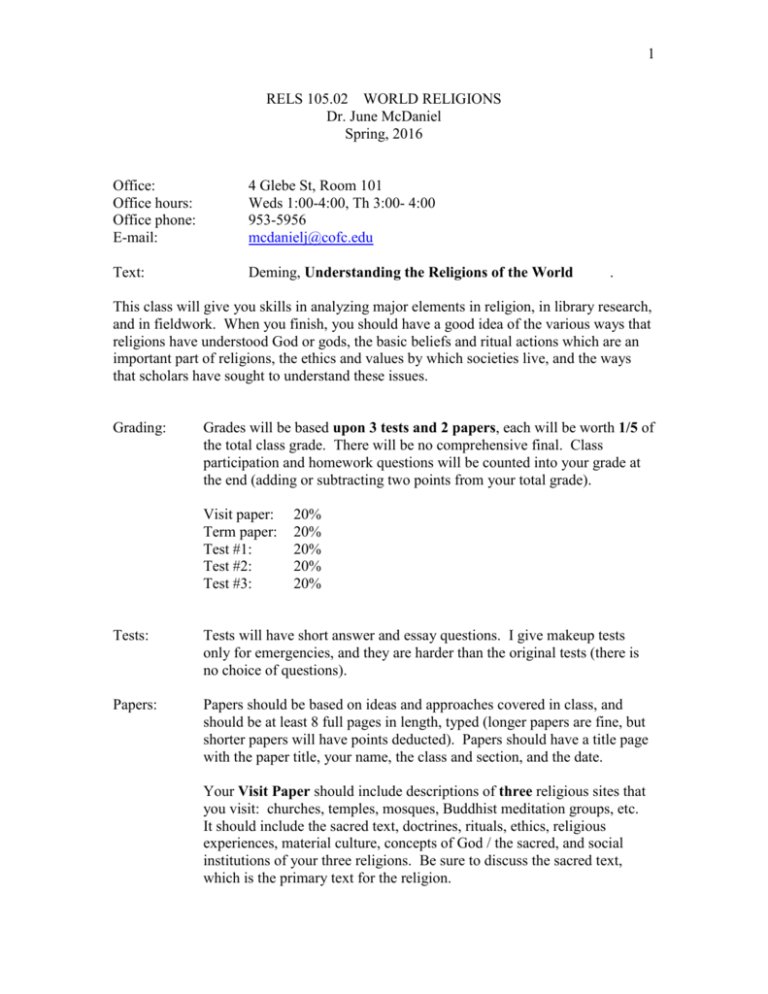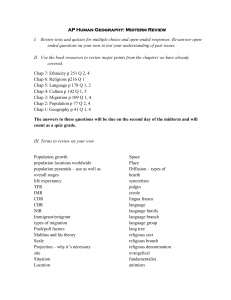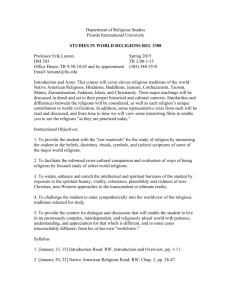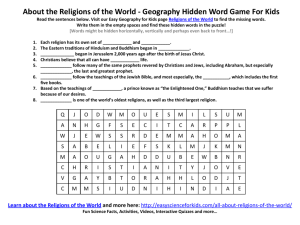RELS 105.02 Intro to World Religions
advertisement

1 RELS 105.02 WORLD RELIGIONS Dr. June McDaniel Spring, 2016 Office: Office hours: Office phone: E-mail: 4 Glebe St, Room 101 Weds 1:00-4:00, Th 3:00- 4:00 953-5956 mcdanielj@cofc.edu Text: Deming, Understanding the Religions of the World . This class will give you skills in analyzing major elements in religion, in library research, and in fieldwork. When you finish, you should have a good idea of the various ways that religions have understood God or gods, the basic beliefs and ritual actions which are an important part of religions, the ethics and values by which societies live, and the ways that scholars have sought to understand these issues. Grading: Grades will be based upon 3 tests and 2 papers, each will be worth 1/5 of the total class grade. There will be no comprehensive final. Class participation and homework questions will be counted into your grade at the end (adding or subtracting two points from your total grade). Visit paper: Term paper: Test #1: Test #2: Test #3: 20% 20% 20% 20% 20% Tests: Tests will have short answer and essay questions. I give makeup tests only for emergencies, and they are harder than the original tests (there is no choice of questions). Papers: Papers should be based on ideas and approaches covered in class, and should be at least 8 full pages in length, typed (longer papers are fine, but shorter papers will have points deducted). Papers should have a title page with the paper title, your name, the class and section, and the date. Your Visit Paper should include descriptions of three religious sites that you visit: churches, temples, mosques, Buddhist meditation groups, etc. It should include the sacred text, doctrines, rituals, ethics, religious experiences, material culture, concepts of God / the sacred, and social institutions of your three religions. Be sure to discuss the sacred text, which is the primary text for the religion. 2 Your Term Paper should focus upon a belief or ritual within a particular religion, and have a bibliography of at least 3 books. You should discuss different ways that the belief or ritual has been understood over time within the religion, and describe a specific argument or controversy. You should have a thesis which you are defending, which includes why this controversy is important. I shall hand out a writing guide to help in the organization of the papers. You should discuss your topic with me in advance. If either paper is late, 10 points will be deducted per class late. The passing grade is D-, or 60. Grades are not curved. They range as: A AB+ B BC+ C CD+ D DF 94 and over 90-93 87-89 84-86 80-83 77-79 74-76 70-73 67-69 64-66 60-63 below 60 This course will fulfill the General Education Student Learning Outcomes: SLO Outcome 1: Students analyze how ideas are represented, interpreted or valued in various expressions of human culture. SLO Outcome 2: Students examine relevant primary source materials as understood by the discipline and interpret the material in writing assignments. In particular, you will fulfill the following learning outcomes in your signature assignment “Term Paper” Paper #1- VISIT PAPER In this paper, you will do ethnographic analysis of the different religious sites - churches, synagogues, mosques, Hindu temples, Buddhist meditation groups, etc. At least one should be totally new to you. You are there as an observer, to learn about what religious people do. You can find places for your visits in the Saturday Post and Courier newspaper (they have a listing of local services), in the Yellow Pages, and online. 3 While you are there, ask people around you questions about the religion, its rituals, people‘s behavior, and the reasons for it. Observe the location, participants, and actions that take place, and take notes. Imagine that you are a journalist writing an article for a magazine. Paper #2- TERM PAPER, which will focus on a controversy within a religion, may be done in one of the following ways: 1. Library research on a world religion 2 Interview of members of the religion, combined with background library research. The Visit Paper will be due on 2/2 The Term Paper will be due on 4/12 Discussion days: For discussion days, you should bring in a thoughtful, written question or idea based on the reading for that period, a question that is challenging and interesting. We will go over the questions in class, and discuss them. Questions which generate class discussion will get extra credit. Attendance: There will be THREE allowed absences. On the third absence, I shall note a warning on the attendance roster, that one more missed class will cause a student to be dropped (that will be two weeks of work missed). If you have excused absences (illness, emergency), let me know and I will cross them off. An extra point is given on the total grade for perfect attendance. Academic Integrity and the Honor Code: There is a zero-tolerance policy toward plagiarism or any other form of academic dishonesty in this course. This means that anyone caught taking credit for work that is not his or her own, or cheating in any other way, will receive a failing grade for the course, which will show up on the transcript as an XF grade. Students are expected to abide by the Honor Code of the College. Center for Student Learning: Students can use the Center for Student Learning’s (CSL) academic support services for assistance in study strategies, speaking & writing skills, and course content. The services are free. For more information regarding these services please call (843)953-5635 or visit the CSL website at http://csl.cofc.edu . Disability: If you have a disability that qualifies you for academic accommodation, please present a letter from the Center for Disability Services at the beginning of the semester. For more information, please contact www.cofc.edu/~cds/index.htm 4 ************************************************************* ALL CELL PHONES MUST BE TURNED OFF DURING CLASS! ************************************************************* SYLLABUS Date Topic Assignment 1/7 Introduction 1/12 How do we understand religion? methods of study, ancient religion Introduction 1/14 Magic, Shamanism, African, Native American religion Chap 5, African religion 1/19 Indigenous religions of Oceania (Australia, Polynesia, Hawaii) Chap 6, Religions of Oceania 1/21 Hinduism- Vedas and Upanishads, writings and beliefs Chap 1, Hinduism 1/26 Hinduism- Bhakti, Tantra, Yoga, society, rituals 1/28 Hinduism- film 2/2 Theravada Buddhism 2/4 Mahayana, Vajrayana Buddhism 2/9 Buddhism, film 2/11 Discussion day 2/16 TEST #1 Chap 2, Buddhism VISIT PAPER DUE! Bring in a question for Class discussion 5 2/18 Chinese religion- Daoism Film 2/23 Chinese religion- Confucianism 2/25 Japanese religion 3/1 Ancient Near East, Egypt 3/3 Zoroastrianism 3/8 SPRING BREAK 3/10 SPRING BREAK 3/15 Judaism- types, writings, 3/17 Judaism, festivals, modernity 3/22 Test #2 3/24 ChristianityCatholicism 3/29 Christianity- Orthodoxy Guest speaker 3/31 Christianity- Protestant, Mormon, Quaker 4/5 Islam History, writings, beliefs 4/7 Islam- ritual, modernity 4/12 New Religious Movements, Rastafarianism, Wicca 4/14 Atheism, secularism and science Guest speaker 4/19 Test #3 4/21 Interfaith dialogue, globalization, Scientology Chap 3, Chinese religion Chap 4, Japanese religion Part 9 Chap 8 Chap 9 Chap 10, Change in Religion TERM PAPER DUE!






